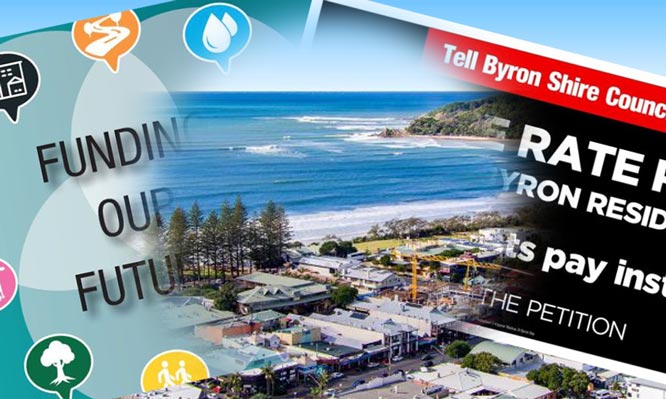Voice of Byron regular, Chris Jones Harris, summarises Jens Krause’s damning report about Byron Shire Council’s attempt to raise rates by around 50%.
For those who may be interested here is a detailed rebuttal of the Byron Shire Council’s case for a rate rise.
Put simply there is no case.
Almost all of the case for a rate rise is ill founded based on largely or totally unsubstantiated assertions about the financial position of the cancel and/or of the false suggestions that there are no alternatives. I have listed the key points below (taken from the document) for those who don’t want to read it.
Thanks to Jen Krause for all the hard work he put into this. The link to the full report is at the end of this post.
KEY ISSUES
1.1: Council’s publicly stated position on the funding shortfall is wrong. The funding gap is $2 million not $6 million. (see section 3).
1.2: There are alternatives to a rate rise for funding any shortfall, where one exists (see section 2). There are numerous alternatives set out in that section .
1.3: Funds derived from the parking fees should be re-allocated. Funds which were intended for the backlog have been appropriated for new projects and this needs to be reversed . They should be replaced by S94 funds for any new works.
1.4 There is no urgency: Council only includes the additional revenue from its proposed SRV from 2019/2020 onwards. There is no inclusion of the funds from the SRV until then. So a postponement of the SRV would have no material impact on council’s planned infrastructure program.
1.5: Council needs to focus on the backlog, not new works. Currently it is spending money, such as parking fees, which were intended for the backlog on new works/improvements. While legal, this is, effectively, misleading ratepayers about both the rationale for the parking fees and the urgency of the backlog.
1.6: The community rejected the rate rise: More than 70% of the community voted against the rate rise during community consultations but council just ignored this outcome. So either the community consultation was pure window dressing or any vote for a rate rise will be profoundly anti-democratic (see section 5).
1.7; Councillors and/or the public have been misled: At different times different figures have been given to council and the public, meaning one or the other has been misled.
1.8: The rate proposals are too aggressive and are unnecessary: Byron’s proposed rise is the most aggressive in NSW and ignores other options listed by IPART. It also ignores that fact that business rate differentials (ie the increased amount paid by businesses) are much lower than in comparable councils (eg Lismore and Coffs) and have not increased to anywhere near the same extent as residential rates have. (see section 4).
1.9: Council has completely ignored many alternatives: These include access to low interest loans and to a tourist tax as well as other options set out in section 2 . This is despite the fact that the NSW Government permits tourist taxes (on application) and that it was supported by both Byron United (now Byron Bay Chamber of Commerce) and the NSW Tourism Council)
1.10: Information presented to councillors is contradictory, arguably wrong and undermines the entire basis of the democratic process. See section 6.
1.11: Tourist taxes and bed taxes: Tourist taxes have been clearly agreed by the NSW Government as an option for increased funding (section 2.8).
1.12: Council is actually in a good financial position and is, therefore, not threatened by amalgamation. The backlog ratio between infrastructure maintenance and renewal work and the Shires depreciating infrastructure assets has been decreasing over recent years (see section 7). IPART does not require zero backlog only a positive trend in the backlog ratio (section 7)
1.13: Regardless of how you calculate income and expenditure, a 10% rate rise will leave council with a significant surplus, after all expenditure listed, based on the figures it presents. Even a 7.5% rate rise will have a surplus.
1.14: Council needs to establish an Infrastructure Backlog Fund (IBF) with an existing staff member who is given the task to monitor the reduction in the backlog over time and ensure that expenditure that should be for backlog reduction is being spent on the backlog and ensuring that councillors are aware of any changes.

LETS LOOK AT THIS AS AN ALTERNATIVE ……